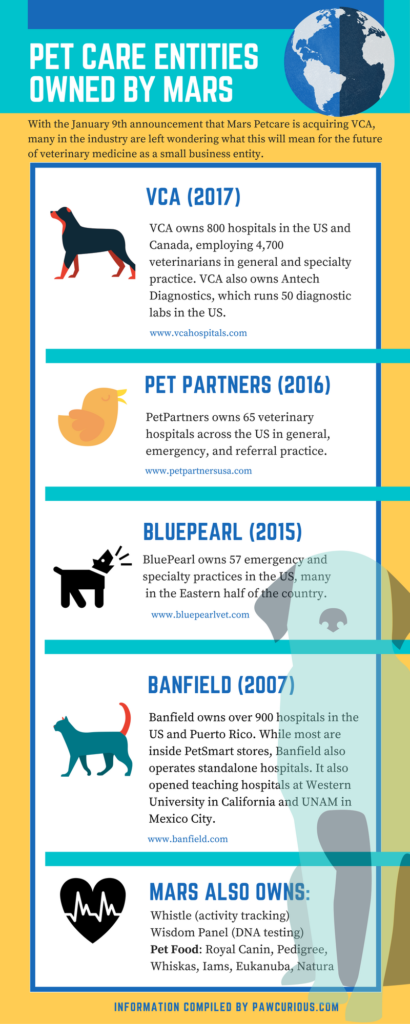We welcome our veterinary overlords! Well, kind of, but not really. Yesterday’s announcement that Mars PetCare acquired VCA for 7.7 billion was a shocker to everyone I know in the pet care industry, which just goes to show you us peons are always the last to know.
Disclosure: I am speaking only for myself here and from my own experiences.
I spent part of my career at Banfield, which is part of the growing Mars empire. That wasn’t the case when I joined, when veterinary clinics were almost entirely veterinarian-owned, including Banfield itself. Scott Campbell, the DVM owner, stood in front of my little group of new hires and promised us with all sincerity that Banfield would never, ever be sold to a corporate entity, a promise he kept for all of four years. It was the first domino to fall in corporate ownership, which many had predicted and he insisted never would.
I left Banfield before the Mars buyout to work in an emergency hospital owned by a husband/wife vet team, and then I came back to Banfield after my second child. In the interim Banfield had undergone the Mars turnover, and to be honest, there was a lot to like. They had implemented evidence-based medicine and were compiling a clinical database the likes of which we had never seen, allowing veterinary medicine to conduct clinical research on a scale that has never been done before. Their anesthesia protocol book is to this day one of my favorite veterinary resources.
The 24 hour emergency hospital I worked at was a bit of a Wild West environment in that we had more leeway and less oversight, in a crazy busy environment; as you can surmise this is both a good and a bad thing depending on who is at the wheel. I learned a ton in a trial by fire way, but I also had little to no safety net. (That hospital was later acquired by VCA, and is also now part of the Mars empire. There’s no escape!) There’s pros and cons to everything, as a client, and as an associate.
Mars: Chocolate and Pets are a Natural Fit
(that’s a joke)
With yesterday’s acquisition, Mars Petcare is now the largest moneymaker in the Mars divisions. After the big Banfield takeover in 2007, things quieted down, but for the last couple of years Mars has been on a tear. They almost doubled the number of hospitals they owned with yesterday’s news, which is the biggest since they bought Iams/Eukanuba off Procter and Gamble in 2014. They own a lot of pet companies.

That’s a lot of pet hospitals, pet foods, labs, and pet foods. What’s more, it’s two of the biggest hospital groups in the country, now under one umbrella. (Note: The affiliation with Western University’s teaching hospital ended at the end of its ten year contract, in 2014.)
On the one hand, when you consider there’s about 29,000 veterinary clinics in the US, the total now owned by Mars seems like a drop in the bucket. Around 7%:

On the other hand, I’m not naive enough to think this trend stops right here. That’s probably what optometrists and pharmacists said way back in the good old days, too.
So What Does This Mean?
I wish I could tell you, but just like everyone else, I can only guess and postulate. Let me be clear: I am 100% neutral on this. I am Corporate Switzerland. When I had two young children, working for Banfield offered me the most stable hours and a good salary in an environment where I was able to practice very good medicine. I always felt empowered to do what was best for my patients, including referring to outside hospitals, deferring vaccines, providing the best pain management I had access to, scripting out meds. I never felt obligated to recommend Mars-owned pet foods and felt free to discuss any brand prescription diets I wanted to.
I know there’s lots of horror stories out there too, and I don’t imply they don’t exist. Asses are everywhere, and they are asses because they are asses, not because of where they work. They spread their miasma wherever they go, and I’ve encountered it in environments corporate and private. The veterinarians you will encounter in a corporate practice were educated in the same places, cry the same amount in frustration, care the same way, stand up for the patients, and occasionally prove themselves poor examples of the profession, in exact same proportions as vets in privately owned practices.
To the same extent corporate ownership increases bureaucracy and headaches, it pumps much needed investment into failing businesses, brings in better medical oversight, and can offer more diverse opportunities for employees and customers.
It also provides more leverage for buying power and advertising, which often squeezes out mom-and-pop operations without those same advantages. I can understand why so many business owners are worried. It’s a valid worry.
Bottom line: As a client, I don’t think you’re going to see big changes, at least not in the short term. If you have concerns, talk to your veterinarian. We’re all trying to sort out what this means too- as far as I know we all found out this morning when you did too.
As a veterinarian: Buckle up. I anticipate much hand waving in the near future. Do we welcome our veterinary corporate overlords or join the rebel alliance?
If you have any insight from the trenches, please do comment.





